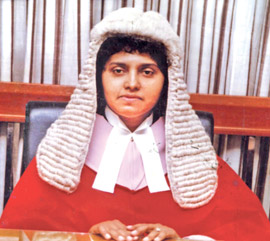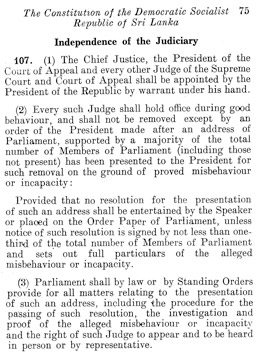Impeachment motion against CJ Constitutional – Minister Keheliya
Rambukwella
By Manjula Fernando
|

Chief Justice Dr. Shirani Bandaranayake
|
The handing over of the Impeachment Motion against the Chief Justice,
Dr. Shirani Bandaranayake to the Speaker with 117 signatures of
Government MPs became the hot topic among political, media and
diplomatic circles last week with the matter reaching as far as Geneva
when the Sri Lanka faced a peer review of its human rights record (UPR)
at the UN Human Rights Council on Thursday. To a question raised by the
US representative the leader of Sri Lanka’s team, Minister Mahinda
Samarasinghe had also responded.
The Sunday Observer spoke to three key personalities, the Deputy
Speaker, Government Spokesman and a constitutional expert to clarify
matters connected with this move taken by the Government.
Deputy Speaker, Chandima Weerakkody speaking to the Sunday Observer
explained as to how the motion will proceed in Parliament in the coming
days.
“When a No Confidence Motion against a Chief Justice, a Supreme Court
Judge or a Judge of the Court of Appeal is handed over to the Speaker
under Article 107 (02) of the Constitution, the Speaker has to place it
on the Order Paper. And thereafter as provided in Section 78 of the
Standing Orders, a select committee comprising more than seven MPs must
be appointed, then thereafter the select committee has to call for
explanation from the Judge concerned. Then the committee can go for an
inquiry in which the committee is authorised to call for any person,
document or organisation concerned to give evidence. Within a period of
one month, the select committee has to come to conclusions, and submit a
report to Parliament which will have to be passed by a simple majority.
Thereafter, such reports should be presented to the President of the
country for a final determination.
The President on addressing Parliament can then declare the removal
of the judge concerned if he so decides based on the decision of the
select committee.
When you take into consideration the period given for the select
committee to complete their report which is one month, there can’t be a
delay in placing the Motion in the Order Paper. When the Motion against
former Chief Justice Neville Samarakoon was handed over, it was placed
in the Order Paper immediately and the select committee was appointed
the next day. And the committee sat immediately and called for
explanations on that day itself. The Chief Justice could submit her
explanations in writing and she could give evidence in person before the
committee.
 The Motion against Samarakoon was presented by former President R.
Premadasa who was a Cabinet minister at the time. The Motion against Samarakoon was presented by former President R.
Premadasa who was a Cabinet minister at the time.
If the committee finds it difficult to complete the work within a
month an extension can be sought from Parliament. On the last occasion,
such extensions were granted on two occasions which resulted in getting
a couple of more weeks being given to complete the work of this select
committee.
Government Spokesman and Media Minister, Keheliya Rambukwella
explaining the reasons that led to the move by the Government MPs
refuted that it was done as a result of a clash between the Executive
and the Judiciary.
“There is absolutely no point in making allegations and counter
allegations. To start with, things cannot happen without a reason.
Notwithstanding the allegations if there is a clash between the
Executive or the Judiciary, when there are allegations of wrongdoing, it
has to be investigated.
As far as the Government is concerned it is not a matter of the
Judiciary having a clash with the Executive. There are certain reasons
that had been raised by legislators, not by the Executive, to probe
certain affairs of the Chief Justice and her conduct. Equally she has a
right and freedom to come before the select committee to clear her name.
She could even be represented by a lawyer.
We have not done this according to the law of the jungle. We did not
hire the underworld, the sort of ‘Kalu Luckys’ to insult the Judiciary
or stone their houses.
The procedure that is taking place now is 100 percent constitutional,
it is not outside the Constitution. In fact why this provision has been
made in the Constitution is that it could be used in a situation of this
sort where smooth functioning of the three institutions – the Judiciary,
the Legislature and the Executive - are in question.
It is to be used in an event of a necessity and we feel now there is
a serious necessity to exercise this provision that has been set out in
the Constitution, to look into the conduct of the Chief Justice.
Otherwise this will develop into a cold war between the Judiciary and
the Legislature, and also the Executive. As a result the rights of the
people can be jeopardized by all parties concerned. Section 3 of the
Constitution clearly talks about the sovereignty of the people. When you
have a doubt you have to get it cleared. You cannot play with it.
All constituent parties of the Government have endorsed the Motion.
If this cold war is to continue, the credibility of a government will be
lost in the face of the international community and the public.
Q: Aren’t you concerned that this could be used against the
Government as a key weapon to question its human rights record at the
UPR and the subsequent HR council sessions in March. Have you not taken
a great risk by this move?
If we practised the Law of the jungle, of course then it can be
dubbed as a risk but this procedure which is taking place now is within
the Constitution.
Why are these provisions in the Constitution if the Legislature
cannot make use of it at a time of necessity? The Constitution is the
basic law of the country. This right has to be respected by everyone.
Even the Executive can be impeached. If he acts against the
Constitution, there are clear provisions for his impeachment.
A constitutional law expert S.L. Gunasekera, said I am the one who
opposed Shirani Bandaranayake’s appointment at the time. I went on TV
and criticized her appointment. How could a person who had not appeared
for a single case, who had a university background accept the post of
Chief Justice was my contention at that time.
Later her husband was given a top post at the Sri Lanka Insurance
Corporation and the NSB. He was not fit for the post. If she was acting
independently, this offer should have been rejected, they should never
have accepted it.
There is no question that the Government can impeach the Chief
Justice, the Constitution provides for it but I feel this is not the way
it should be done. |


